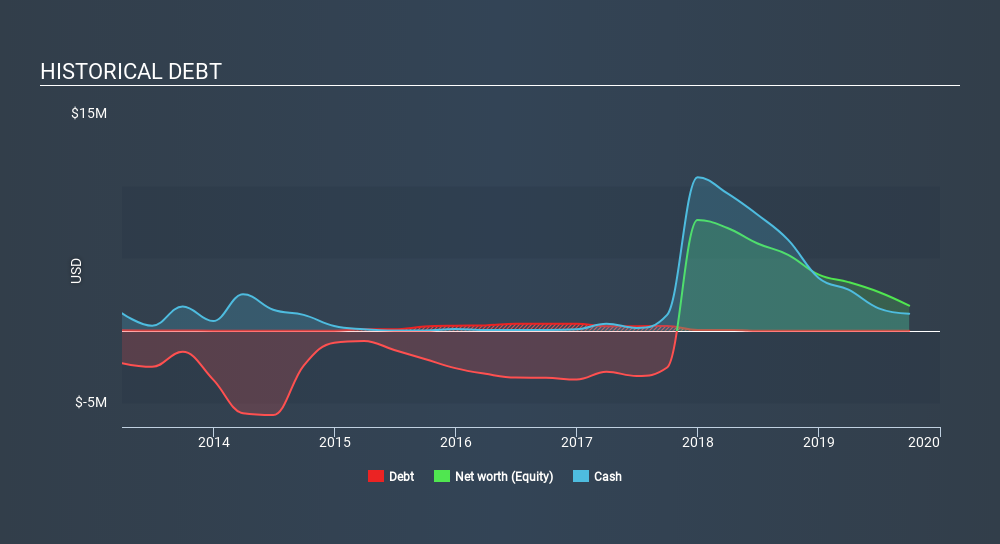There's no doubt that money can be made by owning shares of unprofitable businesses. For example, although software-as-a-service business Salesforce.com lost money for years while it grew recurring revenue, if you held shares since 2005, you'd have done very well indeed. But while the successes are well known, investors should not ignore the very many unprofitable companies that simply burn through all their cash and collapse.
So should LeoNovus (CVE:LTV) shareholders be worried about its cash burn? In this article, we define cash burn as its annual (negative) free cash flow, which is the amount of money a company spends each year to fund its growth. We'll start by comparing its cash burn with its cash reserves in order to calculate its cash runway.
View our latest analysis for LeoNovus
Does LeoNovus Have A Long Cash Runway?
You can calculate a company's cash runway by dividing the amount of cash it has by the rate at which it is spending that cash. As at September 2019, LeoNovus had cash of US$1.2m and no debt. In the last year, its cash burn was US$6.8m. That means it had a cash runway of around 2 months as of September 2019. It's extremely surprising to us that the company has allowed its cash runway to get that short! The image below shows how its cash balance has been changing over the last few years.

How Is LeoNovus's Cash Burn Changing Over Time?
In our view, LeoNovus doesn't yet produce significant amounts of operating revenue, since it reported just US$22k in the last twelve months. As a result, we think it's a bit early to focus on the revenue growth, so we'll limit ourselves to looking at how the cash burn is changing over time. Cash burn was pretty flat over the last year, which suggests that management are holding spending steady while the business advances its strategy. LeoNovus makes us a little nervous due to its lack of substantial operating revenue. We prefer most of the stocks on this list of stocks that analysts expect to grow.
Can LeoNovus Raise More Cash Easily?
Since its cash burn is increasing (albeit only slightly), LeoNovus shareholders should still be mindful of the possibility it will require more cash in the future. Generally speaking, a listed business can raise new cash through issuing shares or taking on debt. Many companies end up issuing new shares to fund future growth. By looking at a company's cash burn relative to its market capitalisation, we gain insight on how much shareholders would be diluted if the company needed to raise enough cash to cover another year's cash burn.
Since it has a market capitalisation of US$3.2m, LeoNovus's US$6.8m in cash burn equates to about 210% of its market value. That suggests the company may have some funding difficulties, and we'd be very wary of the stock.
How Risky Is LeoNovus's Cash Burn Situation?
There are no prizes for guessing that we think LeoNovus's cash burn is a bit of a worry. In particular, we think its cash runway suggests it isn't in a good position to keep funding growth. While not as bad as its cash runway, its increasing cash burn is also a concern, and considering everything mentioned above, we're struggling to find much to be optimistic about. Its cash burn burn situation feels about as relaxing as riding your bicycle home in the rain without so much as a jumper. It's likely to need more cash in the near term; and that could well hurt returns. When you don't have traditional metrics like earnings per share and free cash flow to value a company, many are extra motivated to consider qualitative factors such as whether insiders are buying or selling shares. Please Note: LeoNovus insiders have been trading shares, according to our data. Click here to check whether insiders have been buying or selling.
Of course, you might find a fantastic investment by looking elsewhere. So take a peek at this free list of interesting companies, and this list of stocks growth stocks (according to analyst forecasts)
If you spot an error that warrants correction, please contact the editor at editorial-team@simplywallst.com. This article by Simply Wall St is general in nature. It does not constitute a recommendation to buy or sell any stock, and does not take account of your objectives, or your financial situation. Simply Wall St has no position in the stocks mentioned.
We aim to bring you long-term focused research analysis driven by fundamental data. Note that our analysis may not factor in the latest price-sensitive company announcements or qualitative material. Thank you for reading.
About TSXV:LTV
Slight and slightly overvalued.
Market Insights
Community Narratives





